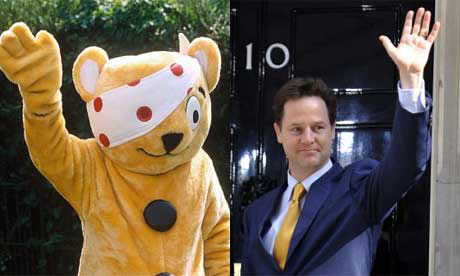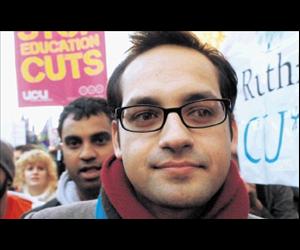An NUS Steward Tried to 'Clegg' Me
'Clegging' - a masterful way of making repressive measures look fair and cuddly - is a tactic spreading to the NUS. Heidi Liane Hasbrouck isn't fooled, and argues the students' union should be radicalised or scrapped
What became clear from the student protest on cuts on 10th November is that the NUS has assimilated the Liberal Democrat political strategy. This can be seen in two peculiar events I experienced on the protest. The first event literally happened at a crossroads. After crawling along with the march for a couple of hours my friends and I decided to push along the sides to see what was really going on in Parliament Square and beyond. Pre-march rumours that there would be a sit in at the Tory HQ had us swoop by the sit-in at Parliament Square. We found ourselves standing at the roundabout at Lambeth Bridge. With protesters coming and going in different directions, we didn't know where to go so we hovered like lost tourists.

It was in this confused moment that we were approached by a friendly steward. She kindly informed us that the protest was over and there was no point of going any further. She explained the protest was larger than anticipated by the NUS and police, that the speeches had happened already and now the police were turning everyone around. I asked, 'Well where is the protest supposed to go to? Isn't it supposed to continue past this point?' She responded 'There's a party at LSE tonight! A post protest party!' To which I retorted, 'I wasn't asking where the party was, I am asking where the protest is!' She looked at me bemused and not prepared for the confrontation. At this moment two police riot vans screeched around the corner and hurtled down Millbank. I glanced down at her nametag - she was from the NUS (National Union of Students). So we went down to Millbank.
What proceeded will be written about in both the mainstream and alternative press for weeks to come. A very large group of protestors smashing in the glass windows of Millbank Tower and successfully occupying it for hours while thousands of us chanted in support. By 8pm the last 200 students would be rounded up and released one by one having to give their names, addresses, birthdays and video taken of the front and backs of their fresh faces. I will leave the analysis of this to others.
The second peculiar event was when a group of students supporting this occupation at Millbank Tower were woo'ed by an NUS representative on a megaphone rationally explaining, 'Everyone has done a great job but the protest is over now. There is nothing happening here anymore. There is an after-party at LSE starting. Come to the party at LSE!' The 'nothing to see here folks' approach of the megaphone preacher dissipated about one third of the exhausted, cold crowd. What I want to write about is the friendly steward and the megaphone party preacher.

Image: NUS National President gets down with the students at the 10th November anti-cuts demo
It was at these two moments that I felt the most deflated. I expect police officers to push me in a different direction. I expect the mainstream media to ignore the cause and focus on the injured female police officer. But purposeful lying by the NUS to sabotage the direct action protest spontaneously taking place at Millbank? As Charlie Brooker quipped, the NUS steward and megaphone party preacher tried to 'clegg me'. But I refused to be clegged into believing everything was fine and a party at LSE was better than direct action. The same can be said for the thousands of other students that participated in the occupation of Millbank Tower. We wont be clegged! So what does this mean for students?
We are not only fighting a battle with the government, we are fighting against the very people that are supposed to represent us. While a lot of pre-protest rhetoric dismissed the NUS as a dying union for career minded future politicians, there was still respect for their organising abilities. It was, after all, the NUS that organised the protest. My run-ins with the NUS at the protest and their official post-protest statements criminalising the direct action by attributing it to a few infiltrating anarchists who ruined a peaceful demonstration exceeded my previous suspicions. The NUS is not a useless, defunct organisation; it is media powerful and divisive. If we begin to attack the NUS, will the big issues be sidelined? Can we continue on with them against us? Has the government successfully divided and conquered? When a union no longer represents its members, and is a corrupt source of power, what do you do? The ultimate question becomes, do you change the union from within or do you scrap it and start afresh?
The NUS has to represent the whole of the student population in the UK, and of course there are various political perspectives on what happened at the protest that need to be taken into account. I spoke to one first year student at Goldsmiths who defended the Goldsmiths Student Union's (GSU) official statement reprimanding Millbank protestors. She said she watched a lot of footage of what happened and felt the protestors were 'mean to the police officers that were defenseless against the crowd.' She said a lot of students at Goldsmiths felt the same way, and the GSU had to address their feelings as well. As many of the Millbank occupiers were Goldsmiths students, including an officer of the SU who was arrested, I felt a decision based on media portrayals of the events was, well... lame. I proposed the job of GSU was not to be reactive to the students' media-led views on direct action but to help educate so that students' opinions would be well informed. Why not a Goldsmiths Town Hall Meeting to decide where to go with the unions and with future protests? Invite occupiers to answer questions and explain their experience and invite the local Liberal Democrat MP, Simon Hughes, to answer questions on the cuts.
Another suggestion is to look at the New York Taxi Alliance. After decades of neglect by defunct and corrupt unions that were out of touch with the workers, a new more radical, more demanding union emerged. The New York Taxi Alliance has successfully built to become the largest taxi union in the city and now collaborates with taxi unions internationally. Through direct action and protest they were able to substantially change their wages and rights for the better. Perhaps we can learn from this.
Students are in a precarious position. We are not asking for worker's rights. If we don't go to school, economic production will not be halted. The effects of the cuts will be a slower, more gradual change in British society. The university will be turning out a different type of student, one that views her education as not the development of her mind, but as a means to a capitalist end. It will look like the American system. The most common question a student studying the humanities will receive is 'What are you going to do with that?' not 'What are you learning about?'

Image: Under the Clegg, the beast?
What are the effects of the American system on American society? The American system creates an underlying anti-political sentiment limiting the boundaries most students feel they can push. As an American undergraduate student protesting the Iraq war in 2003, I made banners, signed some petitions and marched in Washington DC. I did not think to occupy my University. It didn't occur to any of the predominately left wing students in my university that this was a boundary that could be crossed. The political spectrum was on par with most universities in the US (there are a few truly left schools): Democrat or Republican.
As a student protestor who occupied the roof explained to me yesterday,
I pushed a little and realised we were winning, so I thought what happens if we push a little more, so we did, and we broke a window! Then I thought, wow, we broke the window, what happens if we go inside? Then we got inside! So I thought, if we got this far, could we go further? And before I knew it I was on the roof!
It was not until she pushed one boundary that another became possible. Being crippled by debt, stricter immigration policies, precarious labour trends and cuts in social services and benefits will limit the boundaries we can push. After finishing my undergraduate degree in the US one of my friends went to work at Starbucks instead of pursuing writing. Her reason, 'Starbucks has a great health insurance plan, and I have to start paying my loans back in 6 months.'
Heidi Liane Hasbrouck <heidiliane AT gmail.com> is a PhD candidate at the Centre for Cultural Studies, Goldsmiths College
Info
Charlie Brooker, 'All hail the human face of the coalition: Nick Clegg – sad-eyed defender of the new reality',The Guardian, 25 October 2010,
http://www.guardian.co.uk/commentisfree/2010/oct/25/charlie-brooker-nick-clegg
Mute Books Orders
For Mute Books distribution contact Anagram Books
contact@anagrambooks.com
For online purchases visit anagrambooks.com






